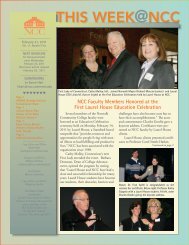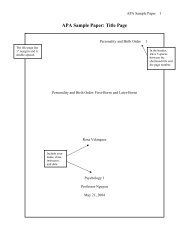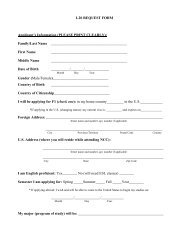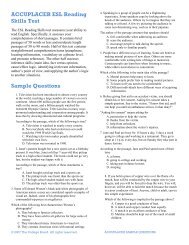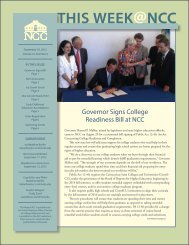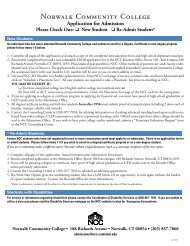FERPA Info - Norwalk Community College
FERPA Info - Norwalk Community College
FERPA Info - Norwalk Community College
You also want an ePaper? Increase the reach of your titles
YUMPU automatically turns print PDFs into web optimized ePapers that Google loves.
<strong>Norwalk</strong> <strong>Community</strong> <strong>College</strong><strong>FERPA</strong>For Faculty, Staff, and StudentsFamily Educational Rights and Privacy Act(formerly the Buckley Amendment)forStudent RecordsThe purpose of <strong>FERPA</strong> is to protect the privacy of educational records. Aneducational record is any record that contains personally identifiable information about astudent who is or was enrolled at the <strong>College</strong>. Students have the right to review their owneducational records.Students have the right to have personally identifiable information contained in educationrecords kept private unless they consent in writing to disclosure. Students have the rightto refuse to permit the disclosure of directory information except to school officials.<strong>FERPA</strong> provides students with certain rights with regard to their education records.<strong>FERPA</strong> permits disclosure of Directory information. The following has beendesignated as “Directory <strong>Info</strong>rmation” by the Connecticut <strong>Community</strong> <strong>College</strong> System.The <strong>College</strong> reserves the right not to disclose "Directory <strong>Info</strong>rmation" to third parties notassociated with the <strong>College</strong> unless, in the judgment of appropriate <strong>College</strong> officials, it isappropriate to do so. Students who do not desire their "Directory <strong>Info</strong>rmation" to bedisclosed must notify the Record's Office in writing. Forms for this purpose are availablein the Record's Office (Room E102).Directory <strong>Info</strong>rmation:• Student name• Address• Full vs. Part-time• Major/program of study• Dates of attendance• Honors, Awards• Graduation dateIn the case of military recruiters <strong>FERPA</strong> also allows disclosure of:• Major/program of study• Age• Level of education• TelephonePage 1 of 5Revised 4-1-10
All other information is non-directory information and requires written consent of thestudent for release of information to a third party.Neither the PATRIOT Act nor the Solomon Amendment (military recruiters) requiresthat military recruiters be provided directory information for students who have directedthe <strong>College</strong> not to disclose their directory information.Personally Identifiable <strong>Info</strong>rmation:Personally identifiable information is defined to include (34 CFR 99.3), but not limitedto:The student’s nameThe name of the student’s parent or other family memberThe address of the student or student’s familyA personal identifier, such as a student’s social security number or studentnumberA list of personal characteristics that would make the student’s identity easilytraceableOther information that would make the student’s identity easily traceableLegitimate Educational Interest:In accordance with <strong>FERPA</strong>, a school official has a legitimate educational interest if theofficial needs to review an education record in order to fulfill his/her professionalresponsibility. This includes such purposes as:Performing appropriate tasks that are specified in her/his position description orby a contract agreementPerforming a task related to a student’s educationPerforming a task related to the discipline of a studentProviding services for the student such as counseling, job placement, or financialaidLegitimate educational interest DOES NOT convey inherent rights to any and all studentinformation. The law discriminates between educational interest, and personal or privateinterest; determinations are made on a case-by-case basis. Educational interest does notconstitute authority to disclose information to a third party without the student’s writtenpermission.<strong>FERPA</strong> allows disclosure of educational records without consent in connection with, butnot limited to:• Compliance with a court order or lawfully issued subpoena• To appropriate parties in a health or safety emergency• To officials of another school, upon request, in which the student seeks to enroll• In connection with a student’s request to receive financial aid, as necessary todetermine eligibility, or to enforce the terms and conditions of aid• To officials of the U.S. Department of Education, the Comptroller General, andstate and local authorities in connection with state and federal education programs• To accrediting organizations carrying out their functions• To certain organizations carrying on their studies on behalf of the <strong>College</strong>Page 2 of 5Revised 4-1-10
• The results of an institutional disciplinary proceeding against the allegedperpetrator of a crime of violence to the alleged victim of that crime with respectto that crimeEducational Records Are:Any information provided by the student to the <strong>College</strong> for use in the educational process• Personal information• Enrollment records• Grades• SchedulesStudent Educational Records May Be:• A file/ document• A computer printout in your office• A class list• A computer display screen• Notes taken during an advisement session• E-mailsPosting of Grades:NCC and the <strong>Community</strong> <strong>College</strong> system provides a secure portal, the WEB forStudent product, for students to view their academic record, and a secure WEB forFaculty product for submitting grades.Any public posting of grades or distribution of grades by any means other than a securemeans is in violation of <strong>FERPA</strong>. This includes posting of grades using student I.D.numbers, social security numbers, or name. The posting of grades to a class website andthe public posting of grades for students taking distance education courses is in violationof <strong>FERPA</strong>. The recommendation is that no grades be posted.Notification of grades by postcard is a violation of <strong>FERPA</strong>. Grades must be in a sealedenvelope with security precautions.Notification of grades by e-mail is not recommended. The institution would beresponsible if any third party gained access, in any manner, to a student’s educationalrecord through any electronic transmission method.Special “DO NOTS” for Faculty:To avoid violation of <strong>FERPA</strong> rules:DO NOT at any time use the student’s social security number or BANNER I.D.number in any public posting, including the classroom. (Example: Do not passaround your class roster for students to sign, initial, etc.)DO NOT ever link the name of a student with that student’s social security orBANNER I.D. number in any public manner.DO NOT leave graded tests in a stack for students to pick up by sorting throughthe papers of all students. Place each one in a separate envelope.DO NOT circulate a printed class list with student name, BANNER I.D., or anyother non-directory information or grades as an attendance roster.Page 3 of 5Revised 4-1-10
DO NOT discuss the progress of any student with anyone other than the student(including parents) without the consent of the student.DO NOT provide anyone with lists of students enrolled in your classes for anycommercial or other purpose.DO NOT provide anyone with student schedules or assist anyone other than<strong>College</strong> employees in finding a student on campus. Refer individuals to the<strong>College</strong> Security Desk.E-Mail Addresses:An e-mail address is personally identifiable student information that must not bedisclosed without the signed written consent of the student.Letters of Recommendation and Verbal CommendationsStatements made by a person making a recommendation do not require a written releasefrom the student. However, if personally identifiable information obtained from astudent’s record is included in the letter of recommendation the writer is required toobtain a signed release from the student.Parental Access:When a student reaches the age of 18 or begins attending a post-secondary institution,regardless of age, <strong>FERPA</strong> rights transfer from the parent to the student. The <strong>College</strong> willobtain an observed signed consent form from the student that authorizes the parent toreceive non-directory information and/or attend a meeting regarding the student’sacademic record. The consent form will be kept on file in the office where the meetingwas held. Should a parent contact you regarding their child, you must check for thisauthorization prior to releasing any information. If the authorization does not exist, donot discuss the student with the parent and advise the parent that the child must givewritten observed authorization before you are allowed to do so.The Media:Nothing in <strong>FERPA</strong> allows an institution to discuss a student’s educational record publicly– even if a lawsuit has made the information a matter of public record. A school officialmay not assume that a student’s public discussion of a matter constitutes implied consentfor the school official to disclose anything other than directory information in reply.Additionally, <strong>College</strong> employees should follow <strong>College</strong> policy regarding the release ofinformation to the media.Best Practice:Best practice is to limit disclosure from and access to personally identifiable studentinformation to those at the <strong>College</strong> who have an articulatable and legitimate need to knowin order to perform the duties of their job. Best practice is not to disclose or provideaccess to personally identifiable student information to anyone outside of the <strong>College</strong>without either the student’s signed and specific written consent or a clear basis under<strong>FERPA</strong>.Page 4 of 5Revised 4-1-10
The Federal Office that Administers <strong>FERPA</strong>:Family Policy Compliance OfficeU.S. Department of Education400 Maryland Avenue, SWWashington, D.C. 20202-4605NCC thanks Antonio L. Veloso, Director, Enrollment and Research Services of Quinebaug Valley<strong>Community</strong> <strong>College</strong>, for the preparation of this <strong>FERPA</strong> document for faculty/staff reference anddistribution.NCC thanks Thomas Clark, Esq., Connecticut <strong>Community</strong> <strong>College</strong> System Office, Student Services LegalCounsel, for his counsel and editing of this document.Resource: Board of Trustees of <strong>Community</strong>-Technical <strong>College</strong>s, Board Policy 5.7.Resource: The AACRAO 2001 <strong>FERPA</strong> Guide; Loyola University; Regis-L elistRevised for <strong>Norwalk</strong> <strong>Community</strong> <strong>College</strong> by: Danita Brown, Registrar1/25/07Page 5 of 5Revised 4-1-10



